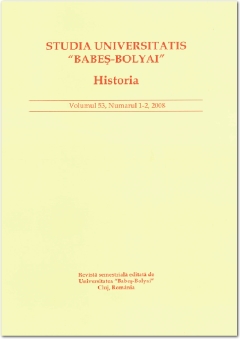„Confesionalizarea”- un concept teoretic relevant pentru studierea religiei, politicii si societătii Europei Est-Centrale din perioada modernă
“Confessionalization”- A Theoretical Concept Relevant for the Study of Religion, Politics, and Society in East-Central Europe during the Early Modern
Author(s): Jörg DeventerSubject(s): History
Published by: Studia Universitatis Babes-Bolyai
Keywords: Confessionalization; Reformation; Counter-Reformation; Catholic Reformation; Early Modern Epoch; Central and Eastern Europe.
Summary/Abstract: “Confessionalization”- A Theoretical Concept Relevant for the Study of Religion, Politics, and Society in East-Central Europe during the Early Modern Period? The paper analyzes the manner in which the paradigm of confessionalization, initially developed for the German space, might be applied in the case of East-Central Europe. First, the discussion focuses on the introduction of the confessionalization model in German historiography, as well as on its main characteristics. Then comes a survey of the objections raised against the concept and of the proposed changes to the theory of confessionalization. These are followed by the presentation of a few ongoing case studies conducted by researchers working at the Institute of Humanistic Studies for the History and Culture of East-Central Europe, of Leipzig, Germany (Geisteswissenschaftliches Zentrum Geschichte und Kultur Ostmitteleuropas, or “GWZO”). In its final part, the study discusses the relevance of the concept of confessionalization for these research projects, which deal with the Crown lands in Bohemia, Poland, and Hungary during the sixteenth and the seventeenth centuries. The conclusions highlight the fact that the various processes of confessionalization occurred in the region are more complex and multifaceted than those seen in the small German principality or within certain great monarchies, united and centralized, such as those in Western Europe. Furthermore, the specific social, political, cultural, and religious features of the region require an approach focused first and foremost on the local and the regional levels.
Journal: Studia Universitatis Babes-Bolyai - Historia
- Issue Year: 53/2008
- Issue No: 1-2
- Page Range: 33-58
- Page Count: 26
- Language: Romanian

